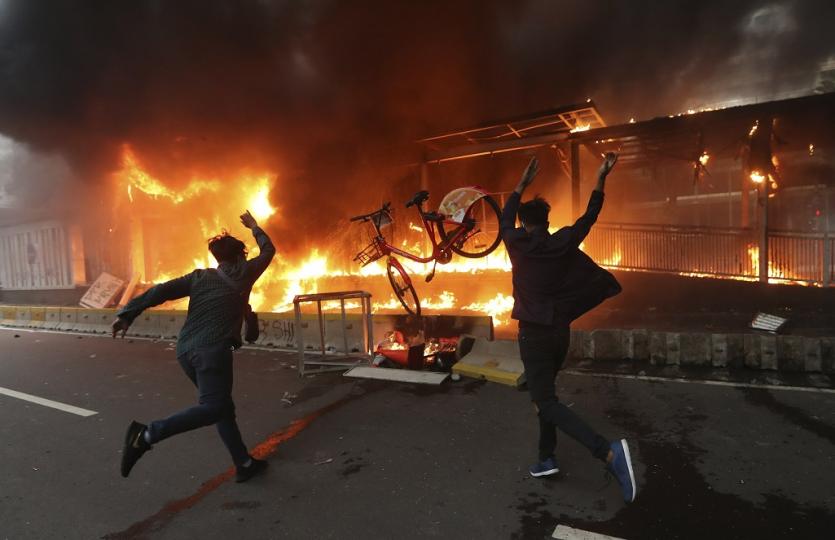Protesters add a bicycle to a burning metro station during a rally in Jakarta, Indonesia, Thursday, Oct. 8, 2020. Thousands of enraged students and workers staged rallies across Indonesia on Thursday in opposition to a new law they say will cripple labor rights and harm the environment. Photo:AP
Indonesia is overcome with widespread protests over new labour laws
By Patryk Krych | The World Daily | OCTOBER 9th 2020
Police in the Indonesian capital of Jakarta have reported at least 400 arrests over a spread of protests and rioting, initiated by the announcement of an “omnibus” jobs creation bill which had become engraved into the country’s law on Monday.
The new legislation, dubbed the “omnibus” labour law, had seen severe political and civil backlash through the stream of protests. Critics of the law stated that it scraps certain environmental protection laws, as well as certain rights of indigenous communities. It has amended 79 of the country’s laws, and had been approved by seven out of the nine deciding parties.
The Indonesian government has, in the meantime, responded to the backlash. They stated that the new legislation is very much necessary, as it was made with the fallout of the COVID-19 pandemic in mind. The country’s economy has been in shambles due to the pandemic, and this law was supposedly made to help compensate for that.
Through this new law, the country’s complex business structure is being burned down in favour of economic investment and stimulation. Through this, human rights and environmental protection are being pushed aside for the sake of economic recovery.
Indonesia was amongst the hardest hit countries in its region, with greater economic backlash than the neighbouring Vietnam. It’s had around 320,000 people thought to be infected with the virus, and an estimated 6 million who’d lost their jobs as a result of quarantining initiatives taken by the country as a measure of quelling the viral spread.
State news agency Antara reported that during the third day of the strikes; happening all across the country; there occurred a situation near the Presidential Palace in which six police, and 60 protestors were injured. Video footage shows police forces throwing tear gas and deploying water cannons at crowds of protestors, as they retaliated by throwing stones.
“We want to simplify the licensing and bureaucracy [process],” President Joko Widodo told the BBC back in January. “We want speed, so a harmonisation of law is needed to create speedy services, speedy policymaking, so that Indonesia would be faster to respond to every world change.”
President Widodo has claimed that the law is a tool through which new jobs can be created in the midst of the pandemic, as well as help attract more foreign investment and get the economy re-stabilized. Having once been a manufacturer of furniture, as well as a mayor before his presidency, President Widodo often sells himself as a man with the interests of the public at heart, whose main priority throughout his presidency has been the push of economic development.






